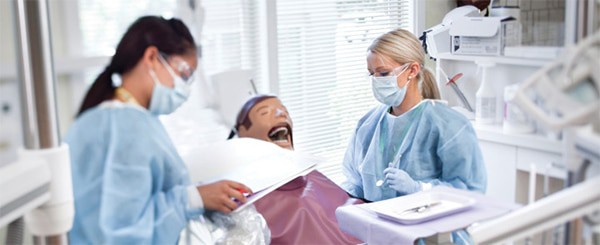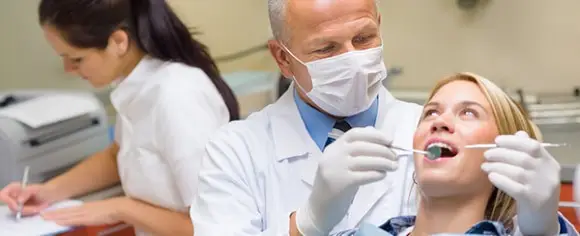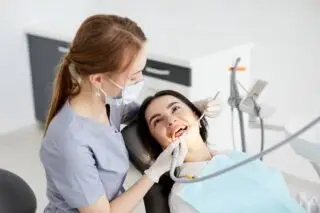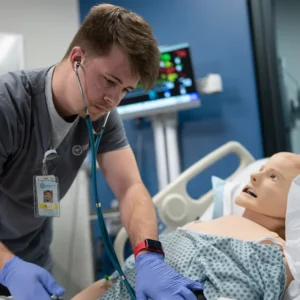
Dentistry, while primarily focused on oral care and dental health maintenance, has several career options. Dentistry professional opportunities are in demand and available, depending on your educational and professional qualifications. Each dentistry professional — dental assistants, dental hygienists, dental laboratory technicians, etc. — works within a team in order to provide value to their client base. Check out an overview for the diverse career opportunities in the dental field below.

What is a Dental Assistant?
Dental assistants provide hands-on help for the dental practitioner. The dental assistant performs preparatory work such as sterilizing equipment, preparing and developing X-rays, and taking impressions/molds of patients’ teeth. Additionally, they guide the patients through their procedures and instruct patients on oral care. More advanced duties may include topical anesthetic, sealant applications, and fluoride applications. Dental assistants may also schedule patient appointments and assist with other office tasks.
How to Become a Dental Assistant
There are several options to become a dental assistant. Some states require you to graduate from an accredited program and pass a state exam¹. Other states, however, require no such formal educational requirements¹.
A dental assistant is an in-demand career. Employment of dental assistants is projected to grow 19 percent from 2016 to 2026, says the Bureau of Labor Statistics (BLS), since ongoing research linking oral health and general health will continue to increase the demand for preventive dental services².
Recommended Reading: How to Become a Dental Assistant
Are you interested in training to become a dental assistant? Check out information on Carrington College’s Dental Assisting program:
What is a Dental Hygienist?
Taking on more responsibility than a dental assistant, a dental hygienist’s work duties include performing dental cleanings, examining patients for signs of oral diseases (cancer screenings and gingivitis), and providing preventative dental care under the supervision of a dentist. They educate patients on ways to improve oral health.
How to Become a Dental Hygienist
Dental hygienists typically need an associate’s degree in dental hygiene³. The job outlook for dental hygienists is decent: It is projected to grow 20% from 2016 – 2026, per the BLS4. While all states require dental hygienists to be licensed, requirements vary by state³.
Recommended Reading: How to Become a Dental Hygienist
Are you interested in training to become a dental hygienist? Check out information on Carrington College’s Dental Hygiene program:
What is a Dental Laboratory Technician?
Dental laboratory technicians or simply dental technicians manufacture dental prosthetics. These projects include bridges, crowns, and dentures. There are specializations in this field, namely orthodontic appliances and ceramics.
How to Become a Dental Laboratory Technician
Most of the skills learned within the four major disciples in dental technology (fixed prosthesis, removable prosthesis, maxillofacial prosthesis, and orthodontics and auxiliaries) are learned on the job. Dental laboratory technicians typically need at least a high school diploma or equivalent, says the BLS5. There are some postsecondary programs in dental laboratory technology at community colleges or technical or vocational schools that award an associate’s degree or postsecondary certificate5.

General Dentist (DDS)
A general dentist’s entry-level position is at the doctoral level. They provide a wide array of services for the continued oral health of their patients, focusing on preventing and stopping diseases through regular examinations. General dentists diagnose and treat patients, potentially offering more advanced treatments, such as bridgework, fitting for dentures, cavity fillings, and root canals — or referring the patient to specialized dentists.
How to Become a Dentist
Dentists must be licensed in the state(s) in which they work6. Licensure requirements vary by state, although candidates usually must graduate from an accredited dental school and pass written and practical exams6.
Orthodontist
Orthodontists specialize in jaw alignment and teeth positioning. By using oral appliances and strategic methods, their practices typically straighten and realign teeth. Orthodontists generally consult and practice on younger patients as their teeth are easier to move. But adult patients do consult with orthodontists, too. Orthodontists are not limited to the dental office as they can sometimes be found in the hospital environment assisting or consulting with patients with traumatic jaw injuries.
How to Become an Orthodontist
Dentists who practice in a specialty area must complete postdoctoral training6.
Periodontist
A periodontist is a specialized dentist who prevents, diagnoses, and treats periodontal disease.
How to Become a Periodontist
Periodontists receive extensive training beyond dental school, learning how to care for the supporting structures of teeth (gums, alveolar bone, and periodontal ligament). As in the case of orthodontists, dentists who practice in a specialty area must complete postdoctoral training6.
Oral and Maxillofacial Surgeon
An oral and maxillofacial surgeon performs surgical procedures on the mouth and jaw. Their procedures repair structural abnormalities or correct a patient’s jaw problem. Some may specialize in reconstructive surgeries for patients that have experienced a significant facial injury. Oral and maxillofacial surgeons find themselves in various work environments such as hospitals, dental practices, or having a practice of their own.
How to Become an Oral and Maxillofacial Surgeon
Just like orthodontists and periodontists, dentists who practice in a specialty area must complete postdoctoral training6.
Important information about the educational debt, earnings and completion rates of students who attended Carrington College can be found here.
Sources:
¹ https://www.bls.gov/ooh/healthcare/dental-assistants.htm#tab-4
² https://www.bls.gov/ooh/healthcare/dental-assistants.htm#tab-6
³ https://www.bls.gov/ooh/healthcare/dental-hygienists.htm#tab-4
4 https://www.bls.gov/ooh/healthcare/dental-hygienists.htm#tab-6
6 https://www.bls.gov/ooh/healthcare/dentists.htm#tab-6



